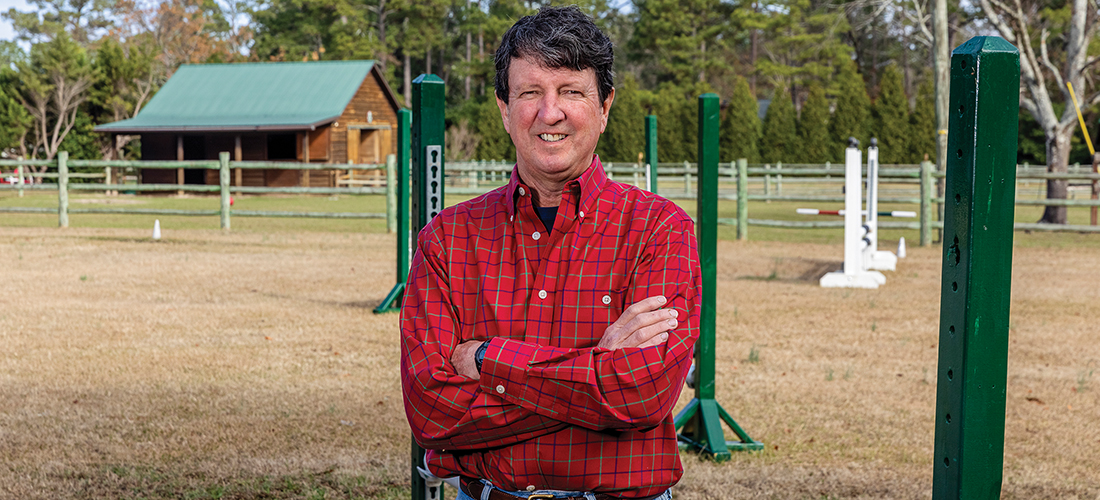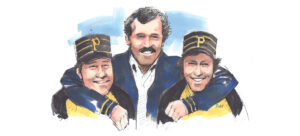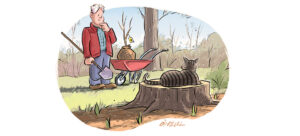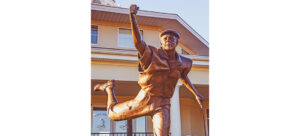
The Voice of America’s Horse Shows
How Peter Doubleday took the mic
By Jenna Biter
An inviting red leather armchair in the library of Little Squire Farm seems to say: sit, read. The 8-foot-tall bookshelves are neatly crowded, as buttoned down as the man himself. There are vinyl albums and CDs, books about foxhunting, and shelves and shelves of others covering all the trappings and intricacies of the equestrian world. Photos of personal import from a career — an almost accidental career — that has lasted nearly half a century occupy nooks and crannies and the rare empty space on a wall. Among it all is a treasured copy of The Horseman’s Encyclopedia that had once belonged to Peter Doubleday’s father, Robert, the man whose riding path he followed.
Peter Doubleday was born and raised in Syracuse, New York, about an hour south of Lake Ontario and a 90-minute drive from Cooperstown, home to the National Baseball Hall of Fame. It was his great uncle Abner (to some unknown degree of greats) who allegedly invented America’s game in Elihu Phinney’s cow pasture in 1839, later laying out a diamond when he was a cadet at West Point. Abner Doubleday went on to become a decorated Union soldier, rising to the rank of general, and was the officer who ordered the North’s first shots of the Civil War in defense of Fort Sumter.
Peter squabbles with the imaginary nonbelievers: “People say, ‘Well, he didn’t invent baseball,’ and I say, ‘Well, yes he did.’” He laughs and settles onto a chaise longue with his Jack Russell terrier, Sophie, who follows him as if there was an imaginary lifeline permanently linking the pair. “The best dog on Earth,” Doubleday says.
Peter’s dad, Robert “Deacon” Doubleday, was a radio show and television personality with NBC’s Syracuse affiliate WSYR. He hosted Wired Woodshed, a popular agricultural program that got rural farmers through their early morning chores. Because Deacon used his voice to make his living, he was asked to announce some horse shows, first on vacations and holidays, but eventually becoming the voice of some of America’s biggest shows.
“So, they would drag me around as a kid to these horse shows all over the Northeast,” Peter says. He enjoyed the show environment — he was a high school kid and there were girls and horses, what’s not to like? — but he didn’t pay much attention to his dad’s role. And he certainly didn’t expect to inherit the mic. But, just as Joe Buck followed his father, Jack, as Major League baseball announcers, Peter Doubleday would follow Deacon. Some careers, particularly the kind that require the God-given talent of voice, are partly chosen, but partly preordained.
After high school, Doubleday traded the chill of upstate New York for the sunshine of South Florida, attending the University of Miami to pursue an education degree. “I kind of wanted to be a teacher,” he says.
After his junior year, his dad fell ill and couldn’t fulfill his commitment to announce the horse show at the 1971 New York State Fair. Deacon told the staff, “Why don’t you try my son?”
The fair was a huge spectator event, but the son nervously rose to the occasion. Though he returned to Miami, Peter pitched relief in a few other shows before his father passed away in January of ’72.
“I wanted to work with horse shows now that I had gotten the bug,” he says. Longtime friends Hannah and Joel Potter owned Rocky Fork Headley Hunt, a foxhunting club and 30-horse stable not unlike the Moore County Hounds, located in suburban Columbus, Ohio. Doubleday moved there to work at the stables mucking stalls, grooming horses, riding and teaching lessons.
“You know how everybody talks about a break? A big break?” Doubleday asks. That’s where he got his. Two of the horses he cared for belonged to Bruce Sundlin. Though the name didn’t mean much to him at the time, Sundlin (who would serve as governor of Rhode Island in the ’90s) was the president of the Washington International Horse Show, a world-renowned, week-long competition in D.C. that draws thousands of spectators each October. Sundlin learned Doubleday had announcing experience and asked him to voice the show. Reluctant at first, it turned out the bug was bigger than the balk. He did it, and he’s had a microphone in his hands ever since.
Doubleday began traveling for shows, returning to Columbus less and less frequently. By 1975, at the age of 25, his announcing career had become full time. He began producing the shows, leading the front end, announcing results, entertaining fans, educating the audience about breeds and classes, and selecting and playing music, including anthems when competitions were international. He also led the back end, communicating with the stables to ensure horses and riders were ready for their events.
“Driving classes, like the Budweiser hitch, it takes a long time for them to get organized,” Doubleday says.
Not long after, he relocated his home base to Southern Pines, though he spent more time in hotel rooms than in any house. “I got involved with the right people, the right horse shows, and boom, I was on the road 40 weeks of the year,” he says, “Sometimes more.”
Success and longevity, however, aren’t matters of getting a break here or there. Doubleday’s adolescence spent at horse shows had familiarized him with quarter horses, Arabians, Morgans and more, allowing him to voice all types of breed shows. Though hunters and jumpers are his specialty, he’s familiar with the gamut of disciplines from driving to dressage, and can announce those, too. “If you really want to do a good job, there’s a lot of work involved,” he says, nodding toward the library.
An effective announcer does more than regurgitate horsey jargon in a caramelized tone. He repackages complex information into digestible morsels, so that even a relatively uninformed audience can enjoy the show. “I drink tea in the morning, and there used to be a little phrase on the back of the tag on Salada bags,” Doubleday says. “One said, ‘Nothing is obvious to the uninformed.’ I always carried that thought.”
Doubleday has announced the major North American horse shows, including the Hampton Classic in New York, the Winter Equestrian Festival in Florida, and the Royal Horse Show in Toronto. He was the voice of two Pan American Games and the 1996 Atlanta Olympic Games. “I’ll never forget my first morning of jumping,” Doubleday says, thinking of Atlanta and the 33,000 spectators in the stands. After delivering a few housekeeping announcements, the arena quieted and the Olympic theme music filled the air. “I said, ‘Welcome to the 26th Olympiad in Atlanta . . . and the place just went craaazy,” he recalls. “I’ll never forget that.”
Doubleday has had success managing shows, too. “The manager is the secretary for the horse show,” he says. “You do the computer work for all the entries; hire a jump crew to put up the jumps; hire people to take care of the footing and the water, make sure the stabling is up — the whole nine yards.”
Once the show starts, he’s hands on. “I’m a worker bee. I can’t sit still.” In an idle moment you’ll find him mucking stalls and picking up trash. “It’s like a hotel, you know, with the horses in and out. I’ll just pitch right in. ‘Let’s get it done.’”
At the height of his managing career, Doubleday oversaw eight or nine horse shows per year. He still manages three major shows: the Royal Horse Show, the Devon Horse Show and Country Fair, and the Devon Fall Classic in Pennsylvania, where he got his managing start in 1987.
COVID, of course, has impacted the workload. At one point, because he can’t sit still, he worked part time at Lowe’s Home Improvement.
Little Squire Farm, where he and his wife, Chrissie — a prize-winning equestrian herself — live, sits on a verdant tract of 10 acres. The cast and crew consist of the couple’s two barn cats; two horses, Woody and Walk My Drive, a retired racehorse who answers to Guac; a donkey named Burrito; and, of course, “the best dog on Earth.”
After nearly five decades behind the mic, Peter Doubleday isn’t quite ready to go silent. The workload in 2021 was nearly back to normal. “After getting in another nice year-and-a-half or so,” he says, glancing around the property, “then I could see myself riding off into the sunset.” PS
Jenna Biter is a fashion designer, entrepreneur and military wife in the Sandhills. She can be reached at jennabiter@protonmail.com.





